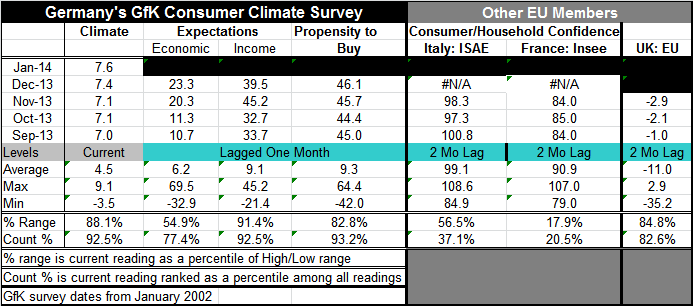 Global| Dec 20 2013
Global| Dec 20 2013Germany Confidence Plows Ahead
Summary
The German GfK consumer climate index has simply continued to expand. The index rise dates back to 2008 and it has risen from that point with only minor interruptions despite some real turbulence in the euro zone since the economic [...]
 The German GfK consumer climate index has simply continued to expand. The index rise dates back to 2008 and it has risen from that point with only minor interruptions despite some real turbulence in the euro zone since the economic crisis hit. Economic expectations have been much more volatile overall, but they have begun to move up very sharply over the past year.
The German GfK consumer climate index has simply continued to expand. The index rise dates back to 2008 and it has risen from that point with only minor interruptions despite some real turbulence in the euro zone since the economic crisis hit. Economic expectations have been much more volatile overall, but they have begun to move up very sharply over the past year.
Germany continues to show confidence levels that are head and shoulders above those in neighboring Europe either for EU or EMU members. The German reading for January 2014 stands in the 92.5 percentile of its historic queue. That compares to the 37.1 percentile for Italy, the 20.5 percentile for France and the 82.6 percentile for the UK. Germany's level has been higher only about 7.5% of the time while Italy's reading has been stronger about 80% of the time.
Among fellow EMU members, Germany is leagues ahead and its momentum shows no sign of let up. This is yet another measurement that suggests that euro zone stability is still being undermined as nations are progressing at very different rates suggesting that national differences are becoming more divergent and that the notion that one monetary policy can serve such an area is becoming ever more strained.
The components for the GfK reading are available only through December. There we see a strong gain for the economy metric which rises from 20.3 to 23.3. The income measure is set back, however, at 39.5 in December compared to 45.2 in November. The buying climate also has eroded to 46.1 in December from 45.7 in November. Still, the climate gauge rose sharply in December.
Moreover, the monthly readings may possess some volatility but all the measures from climate, economic expectations, income expectations and the propensity to buy show strong gains over the last three- or four-months. The other GfK measures also show strong standings in their historic ranges. The relative weakest standing is in the economy variable that is also showing the most recent strength. It stands in the 77.4 percentile of its historic queue compared to an 82.8% standing for the propensity to buy and a 91.4 percentile standing for income expectations.
On balance the GfK readings are all strong and still showing positive momentum. Germany continues to distance itself from its fellow EMU members.

Robert Brusca
AuthorMore in Author Profile »Robert A. Brusca is Chief Economist of Fact and Opinion Economics, a consulting firm he founded in Manhattan. He has been an economist on Wall Street for over 25 years. He has visited central banking and large institutional clients in over 30 countries in his career as an economist. Mr. Brusca was a Divisional Research Chief at the Federal Reserve Bank of NY (Chief of the International Financial markets Division), a Fed Watcher at Irving Trust and Chief Economist at Nikko Securities International. He is widely quoted and appears in various media. Mr. Brusca holds an MA and Ph.D. in economics from Michigan State University and a BA in Economics from the University of Michigan. His research pursues his strong interests in non aligned policy economics as well as international economics. FAO Economics’ research targets investors to assist them in making better investment decisions in stocks, bonds and in a variety of international assets. The company does not manage money and has no conflicts in giving economic advice.
More Economy in Brief
 Global| Feb 05 2026
Global| Feb 05 2026Charts of the Week: Balanced Policy, Resilient Data and AI Narratives
by:Andrew Cates






